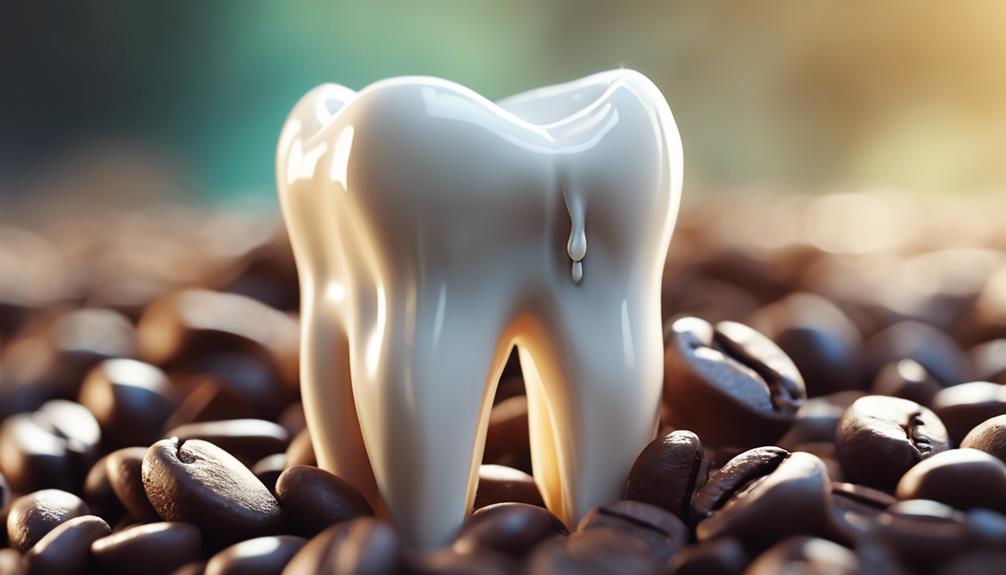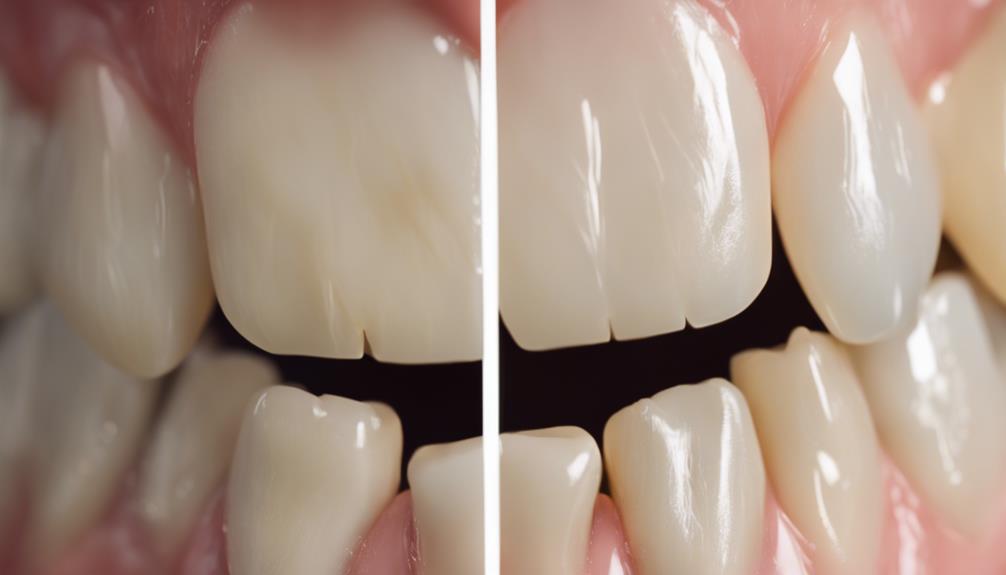While savoring your daily cup of coffee, you are also exposing your teeth to tannins and pigments that can lead to discoloration and erosion, eventually causing sensitivity and brittleness. Consistent coffee consumption may result in extrinsic stains that can be eliminated with dental cleanings. To reduce the negative effects, consider using a straw, rinsing your mouth with water after coffee, and waiting 30 minutes before brushing your teeth. By establishing good oral hygiene habits and implementing a few simple adjustments, you can still enjoy your coffee while safeguarding your teeth. Explore further tips for maintaining a healthy smile.
Key Takeaways
• Coffee's acidity can erode tooth enamel, leading to sensitivity and brittleness over time.
• Tannins and pigments in coffee cause yellow or brown stains on teeth, which can be removed with regular dental cleanings.
• Brushing teeth 30 minutes after coffee consumption can reduce enamel erosion and staining.
• Drinking water after coffee helps wash away residue and prevent staining on teeth.
• Establishing daily oral hygiene routines and drinking coffee through a straw can minimize damage to teeth.
Coffee Staining 101
When you drink coffee, the tannins and pigments in your morning brew adhere to your tooth enamel, causing stains that can lead to discoloration and sensitivity over time. This is because the compounds in coffee can erode your tooth enamel, making it more prone to staining.
If you're a regular coffee drinker, you may notice your teeth becoming more yellow or brown over time. The good news is that regular dental cleanings can help remove these stains and prevent further damage.
To minimize the risk of staining, try brushing your teeth about 30 minutes after drinking coffee. This allows the acid in your mouth to neutralize before you brush, reducing the risk of enamel erosion.
Another trick is to use a straw when drinking coffee, which can minimize direct contact between the coffee and your teeth. By taking these simple steps, you can enjoy your morning coffee while protecting your teeth from stains and damage.
Protecting Your Pearly Whites

When it comes to safeguarding your teeth from coffee's damaging effects, it's crucial to establish a daily routine that prioritizes oral hygiene.
You'll want to focus on developing habits that prevent stains from forming in the first place, as well as maintaining regular dental care practices.
Daily Oral Hygiene Routines
By committing to a consistent daily oral hygiene routine, you can effectively remove coffee stains and prevent long-term damage to your teeth. As part of your daily dental care, brush your teeth at least twice a day for two minutes each time to remove coffee stains and plaque buildup. Use fluoride toothpaste to strengthen your enamel and protect your teeth from coffee-induced erosion. Don't forget to floss daily to clean between teeth and prevent coffee residue from causing decay.
Consider using a whitening toothpaste to combat surface stains caused by coffee consumption. Additionally, schedule regular dental cleanings to remove stubborn coffee stains and maintain excellent oral health. By incorporating these habits into your daily oral hygiene routine, you can enjoy your daily cup of coffee while protecting your pearly whites from damage.
Coffee Stain Prevention Tips
To enjoy your daily cup of coffee without compromising your oral health, you can take a few simple steps to prevent coffee stains from forming on your teeth in the first place.
Using a straw when drinking coffee can reduce direct contact with your teeth, minimizing staining.
Brushing your teeth 30 minutes after consuming coffee helps remove dark pigments and bacteria that cause stains.
Additionally, rinsing your mouth with water after coffee can help prevent residue buildup and maintain oral hygiene.
Drinking water after coffee boosts saliva production, washing away stains and keeping your teeth hydrated.
By incorporating these habits into your daily routine, you can enjoy your coffee intake while maintaining a healthy, stain-free smile.
Regular dental cleanings twice a year are also essential for removing coffee stains and maintaining white teeth, which can be further enhanced with teeth whitening treatments.
Dental Care Best Practices
Practicing good dental care habits is essential to protecting your pearly whites from the negative effects of coffee consumption. You can take steps to minimize the damage by incorporating simple habits into your daily routine.
For instance, wait at least 30 minutes after consuming coffee before you brush your teeth. This allows the acid in your mouth to neutralize, preventing damage to your tooth enamel. When you do brush your teeth, use a fluoride toothpaste and a soft-bristled toothbrush to gently remove stains.
Additionally, rinse your mouth with water after drinking coffee to wash away coffee residue and prevent staining. Regular dental cleanings are also important for removing stubborn coffee stains and maintaining oral health.
Coffee's Impact on Tooth Enamel

As you sip your daily cup of coffee, its acidity can quietly erode your tooth enamel, leading to sensitivity and brittleness. You mightn't notice it at first, but the effects of coffee on your teeth can be significant.
The acidity in coffee can cause enamel erosion, making your teeth more prone to discoloration and cavities. This is because the acidity in coffee can wear away the hard, outer layer of your teeth, making them more susceptible to stains and decay.
Regular coffee consumption can lead to a range of dental issues, from sensitivity to staining. However, it's not all bad news.
By practicing good oral hygiene and limiting your coffee intake, you can minimize the negative effects on your teeth. Additionally, regular dental check-ups can help identify any issues early on, and dental treatments can help restore your teeth to their former glory.
Minimizing the Staining Effects

By taking a few simple precautions, you can greatly reduce the staining effects of coffee on your teeth. When drinking coffee, using a straw can greatly minimize direct contact with your teeth, reducing the risk of staining.
After drinking, rinse your mouth with water to wash away residue and prevent stain buildup on your teeth. It's also essential to brush your teeth 30 minutes after consuming coffee to remove dark pigments and bacteria that contribute to staining.
Regular dental cleanings, at least twice a year, can help remove coffee stains and maintain oral health. Additionally, drinking water after coffee boosts saliva production, which helps protect tooth enamel and wash away stains.
Debunking the Coffee Myth

Now that you've learned how to minimize the staining effects of coffee, it's time to set the record straight on some common misconceptions.
You may have heard that coffee directly ruins your teeth, but that's simply not true. Let's examine the facts: coffee stains teeth brown, and acid erodes enamel fast, but it's not the sole culprit behind tooth decay.
Coffee Stains Teeth Brown
You may have noticed that your teeth take on a brownish hue after a few cups of coffee, and it's not just your imagination – the evidence is clear: coffee stains teeth brown. The culprits behind this discoloration are tannins and chromogens, compounds present in coffee that bind to tooth enamel.
As you sip your daily cup, these pigments seep into the porous surface of your teeth, leaving behind an unsightly brown stain.
Here's what's happening:
Tannins and chromogens in coffee adhere to tooth enamel**, causing discoloration.
The porous nature of teeth** allows these pigments to penetrate and settle.
- Regular coffee consumption leads to gradual discoloration over time.
- Extrinsic stains like these can be removed with professional dental cleanings.
Fortunately, maintaining good oral hygiene practices can help prevent and minimize the brown staining caused by coffee. By understanding the science behind coffee's staining effects, you can take steps to mitigate them and keep your teeth looking their best.
Acid Erodes Enamel Fast
As you sip your morning coffee, its high acidity goes to work, rapidly eroding your tooth enamel and paving the way for sensitivity, brittleness, and a host of other dental issues.
The acid in coffee can erode enamel quickly, making your teeth more prone to sensitivity and brittleness. This erosion is a gradual process, but it can lead to long-term damage to your teeth.
The enamel-softening effects of coffee make your teeth more vulnerable to staining and decay over time. Regular consumption of acidic beverages like coffee can contribute to enamel erosion and dental issues.
To protect your enamel from coffee-related damage, it's essential to practice proactive oral hygiene and limit your exposure to acidic substances. By taking these steps, you can minimize the risks associated with coffee consumption and maintain healthy teeth.
Oral Care Tips for Coffee Lovers

By adopting a few simple habits, coffee enthusiasts can enjoy their daily cup while safeguarding their pearly whites. As a coffee lover, you can take control of your oral health by incorporating these easy tips into your daily routine.
Here are some essential habits to get you started:
- When drinking coffee, use a straw to reduce direct contact with your teeth, minimizing staining.
- Rinse your mouth with water after coffee to wash away residue and prevent stain buildup.
- Brush your teeth 30 minutes after drinking coffee to help remove dark pigments and bacteria.
- Drink water after coffee to boost saliva production, protecting your tooth enamel.
Preserving Your Healthy Smile

To preserve your healthy smile, limiting your coffee intake and adopting good oral hygiene habits are essential steps in maintaining a stunning, stain-free grin. By doing so, you can prevent enamel erosion and tooth discoloration, common issues associated with coffee consumption.
Here are some tips to help you preserve your healthy smile:
| Tip | Description |
|---|---|
| Limit Coffee Intake | Reduce coffee consumption to minimize enamel erosion and tooth discoloration |
| Use a Straw | Drink coffee through a straw to reduce direct contact with teeth, minimizing staining |
| Wait Before Brushing | Wait 30 minutes after consuming coffee before brushing to protect enamel from damage |
Regular dental cleanings are vital for removing coffee stains and maintaining oral health. Additionally, drinking water after coffee can help wash away residue and prevent staining on teeth. By following these simple tips, you can enjoy your favorite coffee while preserving your healthy, stain-free smile.
Frequently Asked Questions
How Can I Drink Coffee Without Damaging My Teeth?
When you drink coffee, you can take steps to minimize its impact on your teeth. Use a straw to reduce direct contact, and rinse your mouth with water afterwards to wash away residue.
Wait 30 minutes before brushing your teeth to prevent dark pigments from adhering to enamel. Additionally, drink water to stimulate saliva production and keep your teeth hydrated.
How Bad Is Coffee for Teeth?
You're likely wondering how bad coffee is for your teeth. The truth is, coffee can be detrimental to your oral health.
The acidity and tannins in coffee erode tooth enamel, causing sensitivity and brittleness. Additionally, coffee stains teeth, leading to discoloration, and its sugar content increases the risk of cavities. Regular consumption can even contribute to bad breath.
It's essential to take preventative measures to minimize coffee's negative effects on your teeth.
How Many Coffees a Day Is Bad for Your Teeth?
As you pour your daily cup, beware: drinking more than 3 cups of coffee a day can be a recipe for disaster for your teeth.
This threshold increases the risk of enamel erosion and tooth sensitivity.
Limiting your intake to 1-2 cups daily can help protect your tooth enamel and overall oral health.
Does Quitting Coffee Help Your Teeth?
When you quit drinking coffee, you'll notice significant improvements in your oral health. You'll reduce the risk of enamel erosion and tooth sensitivity, and prevent staining and discoloration.
Your chances of developing cavities from acidic beverages will decrease, and you'll enjoy fresher breath and improved overall dental health.
Conclusion
You've made it to the bottom line: coffee won't ruin your teeth, but neglecting your oral care routine will. There is no denying that coffee can contribute to surface stains on your teeth, but regular brushing, flossing, and dental check-ups can easily combat this. Additionally, there are natural ways to whiten teeth, such as using baking soda or oil pulling. It’s all about maintaining a balanced approach to your oral care routine, and not letting any one particular food or drink dictate the health of your teeth.
A casual coffee habit can lead to some staining, but it's not a guarantee of tooth decay or destruction.
By practicing good oral hygiene, limiting sugar intake, and visiting your dentist regularly, you can enjoy your daily cup without sacrificing your smile.
Remember, a healthy smile is the result of consistent care, not a coffee-free diet.









